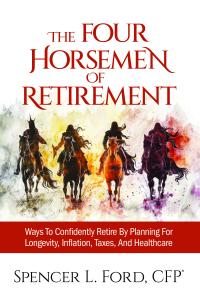Retirement Planning Expert Spencer Ford: It’s Time To Understand The Four Horsemen Of Retirement Obstacles
The goal is to live as well, if not better, than before they retired.”
HARRISON, OH, UNITED STATES, August 21, 2025 /EINPresswire.com/ -- There are four terrible obstacles that turn retirement dreams into a nightmare. — Spencer Ford
That’s the dire warning of Spencer Ford, author of the new book, The Four Horsemen of Retirement: Ways To Confidently Retire By Planning For Longevity, Inflation, Taxes, And Healthcare (2025, Indie Books International).
Ford has chosen the biblical story of the Four Horsemen of the Apocalypse from the Book of Revelation to explain the four major obstacles to overcome for a successful retirement.
The Book of Revelation, also known as Apocalypse of John, is the final book of the New Testament. Though the scriptures only provides a name for the fourth horseman, subsequent commentary identifies them as personifications of Conquest, War, Famine, and Death.
Ford has personified the four horsemen of retirement as Longevity, Inflation, Taxes, and Healthcare:
The Horseman Of Longevity. Longevity can mean running out of money before you run out of life, succumbing to the potential effects of inflation, paying more in taxes, and seeing your hard-earned savings significantly reduced by exorbitant healthcare costs toward the end of life. “According to the Society of Actuaries, there is a 50 percent chance that for a married couple, each aged 65 today, one spouse will be alive at age 92, so these are valid concerns,” says Ford.
The Horseman Of Inflation. It’s impossible to beat inflation, but it can be better managed. Inflation is occurring because the Fed is not trying to stop it completely. The Fed’s target inflation rate is 2 percent. The Fed aims to keep inflation at 2 percent, rather than bringing it to zero. “Due to compounding interest, this means that every 20 years, your dollars will purchase roughly 50 percent less than they did before,” says Ford.
The Horseman Of Taxes. One of the greatest expenses, if not the greatest expense, in retirement is taxes. The average American will pay $525,037 in taxes throughout their lifetime. That’s the average. The average American also has less than $1,000 saved for retirement or anything else. “The horseman of taxes and the horseman of healthcare seem to be duking it out for the top spot of expenses, but no matter who wins that battle, we all lose,” says Ford.
The Horseman Of Healthcare: Healthcare costs may stay relatively low throughout the beginning of retirement, but are likely to increase exponentially as a person ages. Increasing healthcare costs are the horseman of inflation’s playground. Since 2000, inflation in the price of medical care has outpaced the inflation on all consumer goods and services by 35.2 percent. “Become the CEO of your health and have a plan for how to spend your time in retirement and continue to derive purpose in your life,” says ford. “That’s a recipe for success.”
According to Ford, legacy planning is an essential part of mitigating the horsemen, and it is something that is built throughout the whole retirement planning process. It often takes the coordination of multiple professionals to get it right.
“Despite its origin dating back to ancient Rome, the concept of retirement as it exists today is a new phenomenon,” says Ford, a financial consultant with Conservative Financial Solutions LLC. and licensed insurance agent in multiple states.
Ford wants the families he serves to be able to get out during retirement and do the things they want to while they can still do them.
Ford says a person goes through two distinct phases in their financial life. First is the accumulation phase. Typically, this phase happens between the ages of 18 and 55. In this phase, people are younger and working with a paycheck coming in. If the stock market takes a tumble, they aren’t happy about it, but still have that paycheck coming in to back them up. Time is on their side to let their investments recover.
The second half of life, typically between the age of 55 and the end of life, is the distribution phase. They are nearing the point where they no longer have a paycheck coming in—their investments are their paycheck. They’re not putting money in; they’re taking money out.
“The goal is to live as well, if not better, than before they retired,” says Ford. “It certainly isn’t to reduce their income. They may even spend a little extra in those early years of retirement, traveling and doing some of the extra things they couldn’t do while working and saving for their golden years.”
About Indie Books International:
Indie Books International serves as an independent publishing alternative for experts and authorities to help create impact and influence.
Henry DeVries
Indie Books International
+1 619-540-3031
email us here
Legal Disclaimer:
EIN Presswire provides this news content "as is" without warranty of any kind. We do not accept any responsibility or liability for the accuracy, content, images, videos, licenses, completeness, legality, or reliability of the information contained in this article. If you have any complaints or copyright issues related to this article, kindly contact the author above.

